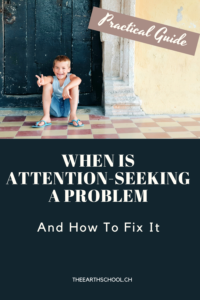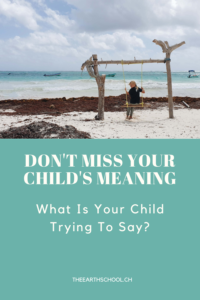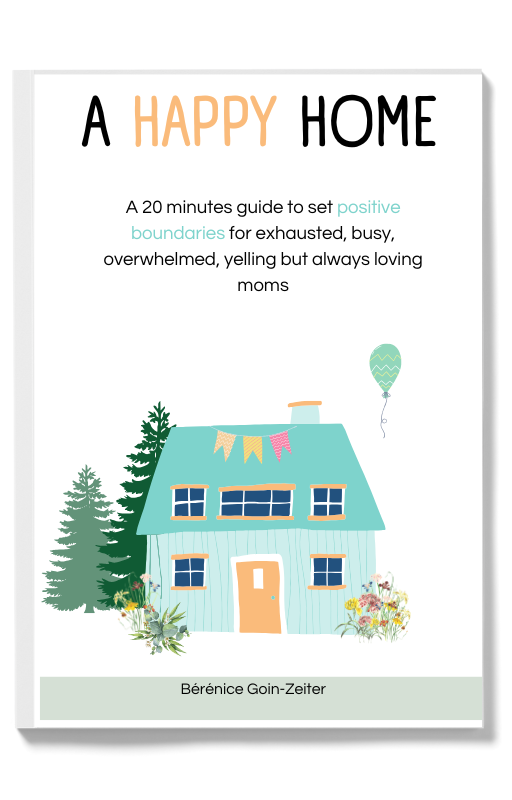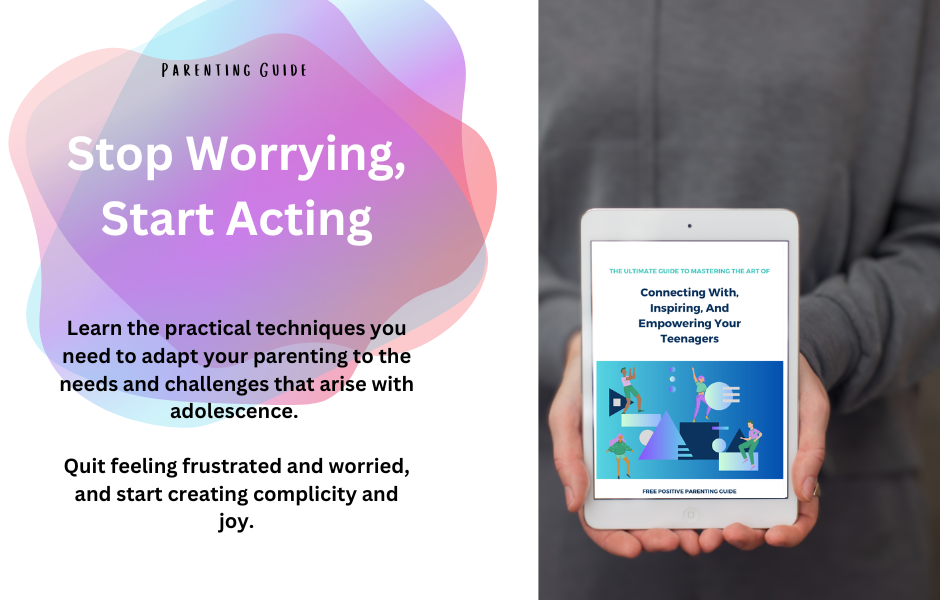
#42 The Three Top Reasons Behind Parental Anger. Hint? It’s Not Your Children
I know that your children are driving you nuts sometimes and that you think: “those children never listen”, “they’re killing me”, “they push me over the edge”… But are you sure it isn’t because you were already angry that you react so strongly?
The other day I saw a question on a Facebook parenting group: « what parenting habits would you love to change but just don’t know how? ». Guess what the number one answer was? « Anger and yelling ».
How do you feel about this? Is this something you’ve experienced? Losing control, yelling, getting mad only to feel awfully guilty about it later?
Because let’s be honest, you would never lose it on a friend, a co-worker, or a stranger the way you do with your children.
Want to watch this post instead of reading it? It’s here!
Why Are Most Parents Prompts To Anger?
It’s definitely your choice of parenting. We all dream to be those comprehensive, nice, patient parents we see in our fantasies (and sometimes at the park).
Truth be told, I had this friend who was always so comprehensive and patient I was in awe. One day I mentioned it to her and she laughed. Actually, she was yelling a lot, a real lot, at home, but never in public.
So I don’t know parents who don’t get angry and don’t yell at their children. Actually, my own anger is what made me start researching positive parenting solutions so many years ago. I feared my own reactions. Couldn’t recognize me.
I could see the fear in my baby son’s eyes and kept yelling. What a terrible feeling.
And the worst in this memory is to know that if our children are the recipient of our anger, they are seldom the reason for it!
[Tweet “Our #children are the recipient of our #anger, but rarely the reason for it.”]
So Many Reasons To Get Angry In Our Lifes
Anger can be the expression of frustration. It says that one of our needs isn’t heard. That’s a common situation for mothers.
We spend a lot of energy on our children, our family, and in return, we might feel that we are not respected and heard in our needs.
Which can be totally true. Mothers often put the others first and end up doing an endless list of things while pushing their personal projects down and down the list.
Do you know that chapter you planned on reading this morning? Or these flowers you were excited to plant? Oh, or that shower you meant to take hours ago because your hair feels filthy and you hate that?
When you feel angry, ask yourself if you have an unanswered need. And take the time to take care of yourself. Just keep in mind that it is not your children’s role to fulfill your needs.
If you expect your children to answer your needs, you are parenting them, you are giving them a responsibility that shouldn’t be a weight on their shoulders.
Which doesn’t mean that they cannot respect your need (for calm, for quiet, for solitude, for a shower!) but you are the one who should identify your need and make demand about it.
For example, you are tired and need a moment to lay down and rest.

You CANNOT expect your children to see that and anticipate. You CANNOT tell them things like « can’t you see I’m tired? », « can’t you see I need you to shut up and leave me alone now? ».
What you CAN do is acknowledge that you need to rest and take a moment. What you CAN tell is things like « I am tired and I need to rest. Could you please play quietly for 15 minutes? », « Mommy needs to lay down a little while, can you think of something to do by yourself? ».
When The Outside World Invites Itself In Your Relationship
Your frustration can be created by someone else, by a circumstance, or a situation. So many reasons to be frustrated… What comes straight to your mind? What gets you easily frustrated?
For me, it is the lack of coverage. Being a nomad family at the moment, mostly in United States National Parks, the poor coverage keeps me from working properly. Oh, and my husband’s inability to wake up in the morning ;-).
You name it. And who’s innocently playing with their little car and making the extra noise that sends you over the edge? Your poor child who receives a shower of anger.
Maybe it’s the simple frustration of not being able to open the damn can! No matter the source, remember that your children are full of comprehension. Just let them know why you are angry so that they know it’s not because of them.
If you do so, they will become spectators of your anger and not victims of it. That’s already an improvement while you work on learning to manage it!
Try sentences like « mommy is so angry because this goddam can is impossible to open!!! », « mommy is not angry at you darling, she is frustrated because she wants to work and she can’t right now ».
When Anger Is The Tip Of The Iceberg, You Have To Dig A Little
Anger isn’t always proper anger. That is to say, anger is a well-known cover-up emotion. Whenever a feeling is too strong, or maybe too unacceptable, our mind throws anger on top of it. As the adult in the room, it is your responsibility to deal with your own anger. But what if your anger is not anger? That makes things a bit more complicated, doesn’t it?
You will see that it becomes easier with time. Actually, it is a very good exercise as it helps you practicing self-awareness. Taking the time to listen to yourself.
Fear and stress are common triggers for anger and you can start there if you’re at loss. Ask yourself if something is stressing you or worrying at the moment.
« Whenever you acknowledge and accept an emotion, it can pass through and you are not enduring it anymore ». – Berenice Goin
Guilt is another good lead to explore. I know that for me, guilt isn’t a trigger but is a good fuel. Let’s say I’m frustrated and get angry at my children. The second I realize I am yelling at them, I feel guilty, which makes me even angrier.
But here is the trick. Once you become aware of those personal particularities, you get power over them.
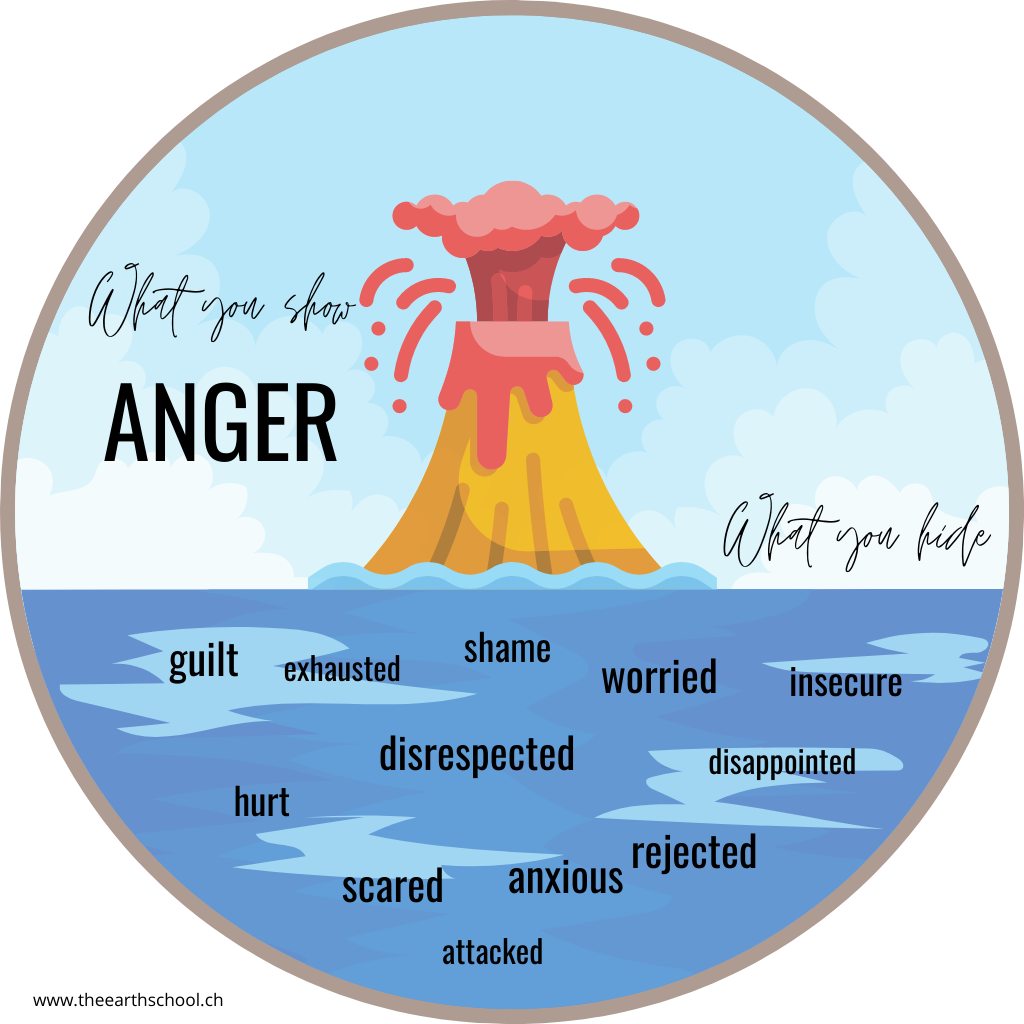
As you can see in this picture, many feelings can be hidden by anger. And the list isn’t exhaustive! Do you know which feeling just came to my mind? Powerlessness. Isn’t that another good trigger for anger?
No matter the underlying feeling, the frustration, or the unanswered need, once you practice spotting the roots of your anger, you will find yourself being less and less often mad at your children.
Take Away
- Anger can arise when a need is unanswered
Is there a need calling for your attention? Have you neglected yourself? - Anger can be an answer to a frustration
Is there a situation bothering you? - Anger can be a cover-up emotion
Can you identify another feeling under your anger?
I wish you all the best with your kids, always remember that we all do the best we can at a given moment, so don’t judge yourself too harshly. Be confident and listen to your intuition. If what you do comes from a place of love, then you’re on the right path.
We share a lot of exciting articles about positive parenting, emotional intelligence, and homeschooling, join the newsletter, don’t miss out!
Join Our Community To Get Inspiration And Tips Straight in Your Mailbox
Don’t let the inspiration fades and take action right away
1 | Decide on one action you want to implement after reading this post and write it down
2 | Share this article with a friend who could benefit from it
3 | Join us on Instagram for more great content

Do you want more?
Don’t Forget To Join Our Community To Get Inspiration And Tips Straight in Your Mailbox
I wish you all the best with your kids. Always remember — we’re all doing the best we can in any given moment, so try not to judge yourself too harshly. Be confident and listen to your intuition. If what you do comes from a place of love, then you’re already on the right path.

If this post resonated with you — if you’ve ever walked ten paces behind your child, wondering if you’re ruining everything — come join us on Instagram.
It’s where I share reminders, reflections, and the odd parenting confession… for mums figuring it out one heart-twinge at a time.
